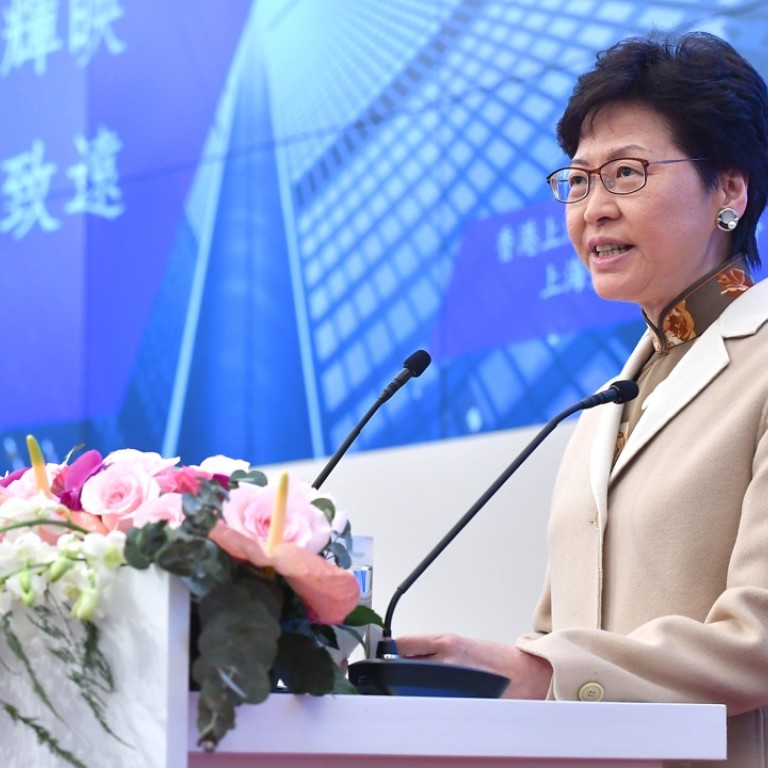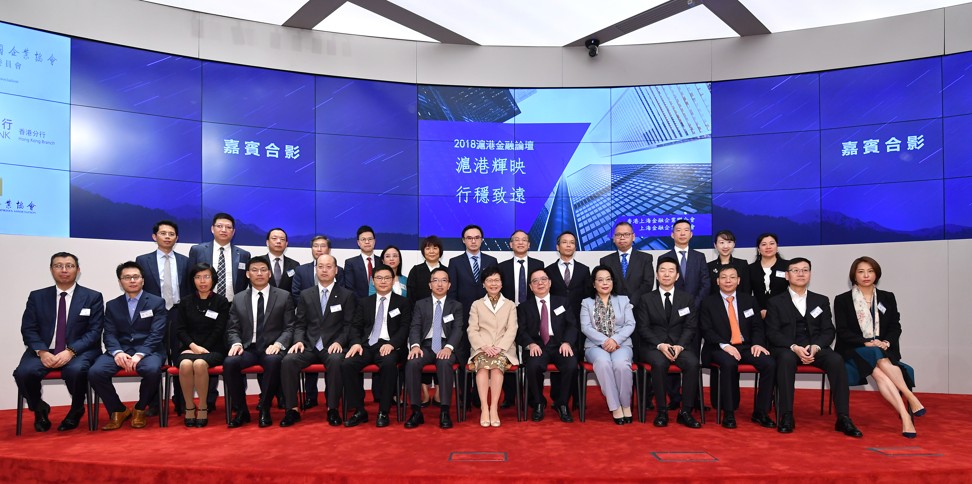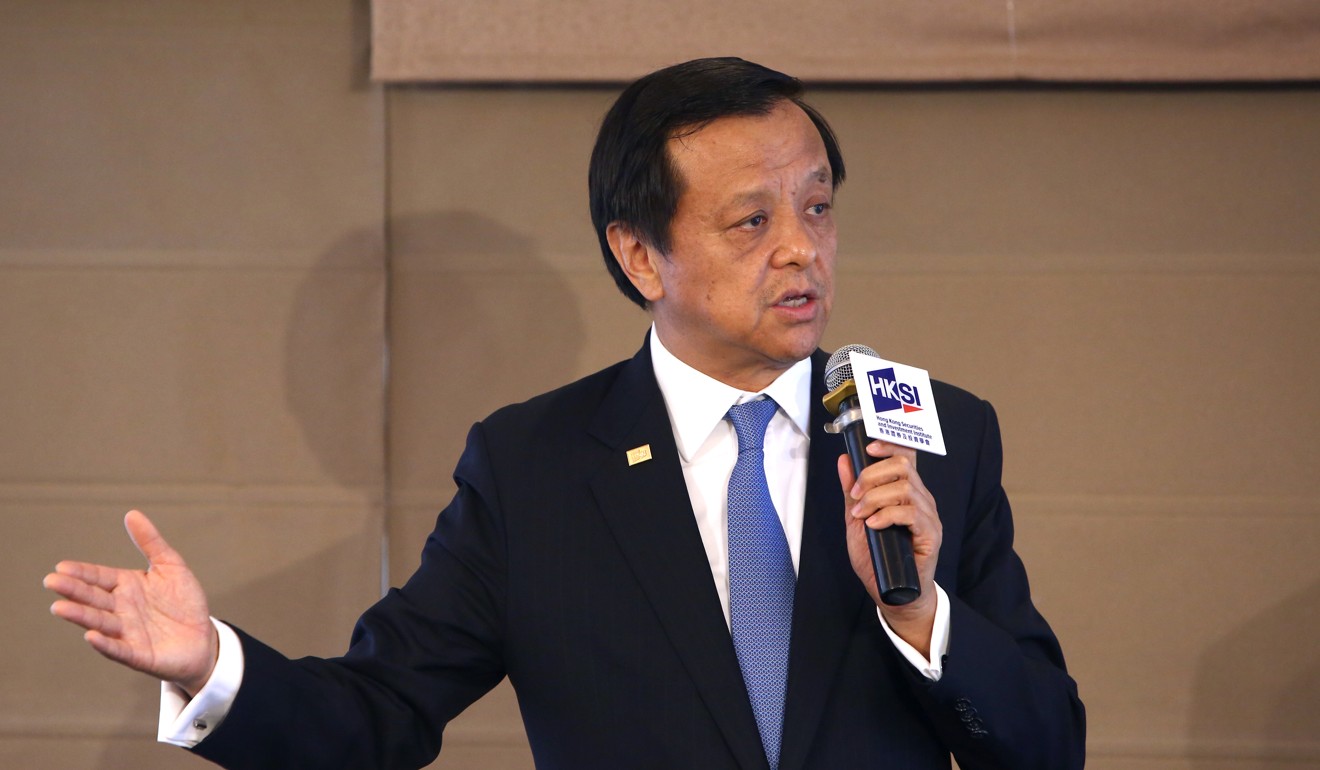
Beijing sends clear message to Hong Kong: join forces with Shanghai and boost China’s financial power
- Hong Kong and Shanghai can complement each other as financial centres and jointly help China boost its competitiveness globally, say top officials
Hong Kong and Shanghai have different starting points in internationalisation and different missions, but they have the same goal, which is to serve China’s needs of reform and opening-up and boost the country’s financial competitiveness in the world, according to a former top Chinese official, reiterating the political message from Beijing.
At a meeting with a delegation of top officials and business leaders from Hong Kong and Macau earlier this month, Chinese President Xi Jinping praised the city’s role in China’s successful reform and opening up over the past 40 years. He urged them to support further opening up and integration into the nation’s development plans.
“China is big enough to house two unique, heavyweight international financial centres and let them both fully develop,” Li Jiange, former vice-chairman of China Securities Regulatory Commission, said on Thursday at a financial forum in Hong Kong, adding that Hong Kong and Shanghai can work together and help each other.

He said that they can build a common capital market so that they can better serve China’s real economy, play a role in the Belt and Road Initiative, yuan internationalisation and Shanghai Pilot Free Trade Zone.
Carrie Lam Cheng Yuet-ngor, Chief Executive of Hong Kong, said at the same forum that she expected Shanghai and Hong Kong to expand their scope of cooperation, as a bigger market will be mutually beneficial.
“China, with all its strength, is trying to boost the competitiveness of the financial industry and develop a healthy capital market,” she said.
As China’s important gateways, Hong Kong and Shanghai have to combine their advantages, so as to play a bigger role in China’s two-way opening up to the world
“Hong Kong and Shanghai will both play an important part in the process and usher in unlimited opportunities, as we can see from President Xi Jinping’s speech.
“As China’s important gateways, Hong Kong and Shanghai have to combine their advantages, so as to play a bigger role in China’s two-way opening up to the world.”
Li mentioned there were misgivings in Shanghai about whether Hong Kong’s capital market development may suppress Shanghai. Similarly, many in Hong Kong were also concerned, especially after Shanghai exchange announced it would launch a new technology board.
“[But] I don’t think it’s necessary to over worry about the competition.”
He said the central government has already discussed the issue of Hong Kong-Shanghai relation before it decided to launch the trial programme of H-share listing in 1992, which was to let Chinese companies list in Hong Kong.
“If one is lagging behind, it’s not because of the other’s suppression, but because the system hasn’t been designed well.”
Li was also a deputy director of the State Council Office for Restructuring the Economic System from 1998 to 2008, which drew up the nation’s blueprint to reform state-owned enterprises (SOEs). He also served as head of policy and regulation division at the former State Economic and Trade Commission.
Charles Li Xiaojia, chief executive of Hong Kong Exchanges and Clearing, also told the forum that Hong Kong and Shanghai exchanges both have different missions.
He said Hong Kong’s financial market has facilitated Chinese companies in fundraising in the past two decades. Now it must grab the opportunities that will come from China’s need to deploy its trillions of dollars of capital globally.

On the stock exchange level, Li said he expects to offer mainland Chinese investors more products to meet their investment and diversification needs. Besides the Stock Connect and Bond Connect programmes which are already in place, he hopes to launch a similar mutual market programme to allow mainland investors to invest in IPOs in Hong Kong.
A number of brokers, bankers, analysts, and corporate executives from Hong Kong and Shanghai’s business community attended the forum.
Ma Jianwei, head of financial institutions in Greater China at Barclays, said Hong Kong has a unique advantage as the first stop and “bridgehead” for many Chinese companies in their strategy to “go global” because of cultural and geographical reasons.
Lin Yuqiao, assistant to president at Shanghai Pudong Development Bank’s Hong Kong branch, also expected Hong Kong to continue playing a unique role in helping Chinese companies raise capital and deploy assets overseas.
Still, he sees policies from the mainland as a big uncertainty in that regard.
Debt issuance in overseas markets by Chinese companies has dropped a little in the past few months, after the National Development and Reform Commission tightened corporate foreign debt issuance earlier this year, Lin said.

